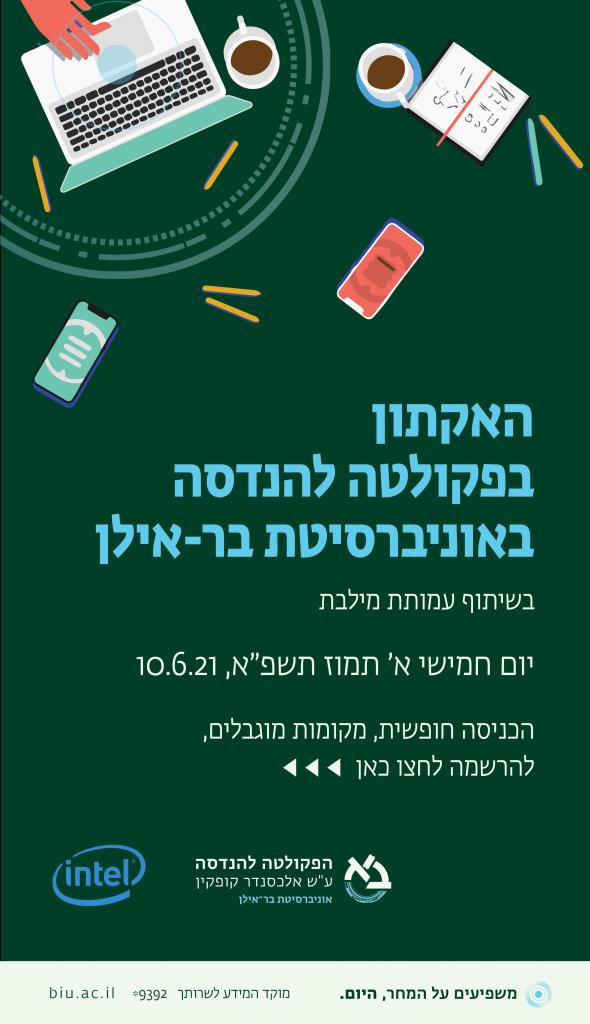Engineers for a Night

During the June 6th all-night hackathon, a collaboration between the Faculty of Engineering and Milbat Tel Hashomer, and sponsored by Intel, participants will have the opportunity to initiate, design, and develop products that improve the lives of people with disabilities
Read more>>
On Thursday, June 6th, the Faculty of Engineering in collaboration with Milbat Tel Hashomer, a non-profit organization that develops technologies for improving independent functions for people with diminished physical capabilities. The goal of the hackathon is to assist people with limited capabilities by developing new technological solutions to make their life easier. The event will take off on Thursday at 5 PM with a panel of people with diminished physical capabilities who will present their lifestyle, their troubles, and how they would like their lives to improve. The participants will then divide off into teams and start working on these problems, from coming up with a solution, through design and all the way to development. The teams will work well into the night, and the hackathon will end at 1 PM on Friday. “Every student I told about the hackathon responded the same way: they said that it’s a lot of work for one night, that they can’t contribute or don’t know how,” says Tomer Locker, who initiated the hackathon. “My goal is to show them that it is possible, that they can do it, that they will have a great time being engineers for a night, and will be surprised with what they can achieve.”
Locker (22) is a third-year student at the computer engineering track. He also works at ENICS, at Dr. Yoav Weizmann, and at Dr. Itamar Levi’s lab. Prior to that, he worked at Dr. Avi Shelly and Dr. Cecil Yehezkel’s lab, where he first learned of Tel Hashomer’s Milbat organization. “Several of students at the lab volunteered there, and the organization’s representatives would contact us every once in a while when they ran into issues they couldn’t solve, and we helped them with the technological aspect,” he shares. “We had, for example, a man with advanced ALS who could only move his eyebrow, so we built him a system that allows him to call for help and communicate using his eyebrow. Another example is our solution for people with hand-related limitations, who cannot properly use the small buttons on their remote controls. We created a universal remote that works with any TV set, with five very big basic function buttons that are so easy to push, you can even use your toes to do it.”
Working with Milbat prompted Locker to initiate the hackathon. “The benefit of working with Milbat is that students can come up with a product, develop it and see it not only come to life, but also change someone’s life for the better, and that’s extremely satisfying,” he declares. “Plus, there’s an element of practical experience. Academic work is naturally focused on theory. Most of the students don’t get the chance to actively engineer before they enter the industry. The hackathon has a significant element of learning while doing. We simply throw the participants into the deep end, and they have no choice but to start swimming.”
But of course, there will be lifeguards on-call… Experienced industry engineers will be available to help out as needed. Other engineers will make up the judges panel, which will include Avi Salomon, Innovation Lead for the Intel Israel Development centers, Prof. Rachela Popovtzer, vice-dean of the Faculty of Engineering, and others. Event sponsor Intel will provide Arduino kits – smart controllers used for constructing and programming circuits. Intel is donating the first place prize of $1,000. The second prize, 2,000 ILS, is provided by the bioengineering track at the Faculty.
Last Updated Date : 08/06/2021



